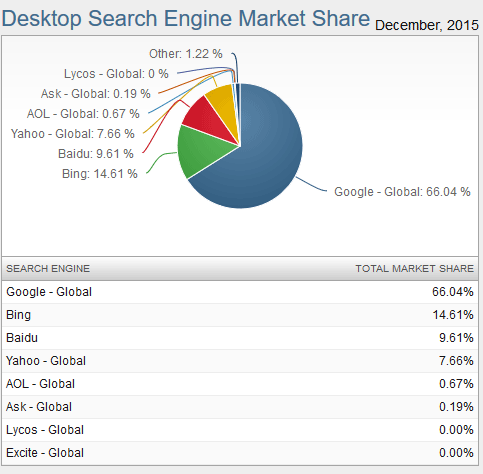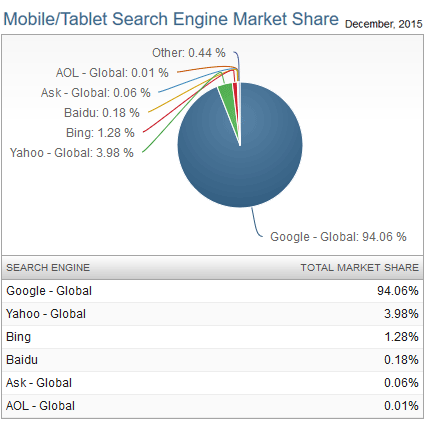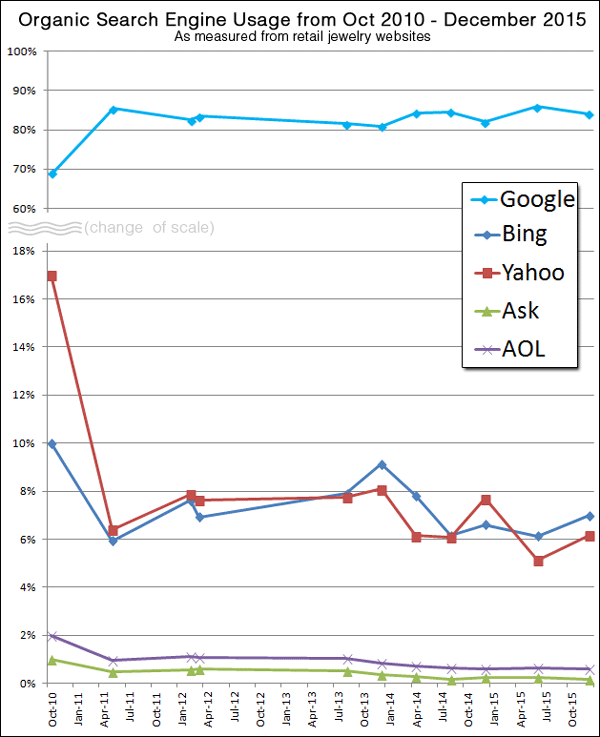
Welcome to #ThrowbackThursday edition of the Daily Golden Nugget. As I looked back over my recent data, I realized I haven't analyzed the top performing search engines for quite a long time. The last time I reported the top search engines results was back in May 2014.
I've collected a lot of data since then, and now I can even report on the differences between desktop and mobile search engine usage.
Global Search Engine Data
Thanks to the folks over at Net Market Share we can see how the global search engine popularity for desktop search broke down in December 2015:

(Data provided by Net Market Share)
Bing has struggled for years to acquire the 14.6% market share they have now. Baidu is the most popular search engine in China, which I mentioned earlier this week in my discussion on establishing your global ecommerce website. Yahoo! is very popular in Japan and other places where Japanese is spoken. Google has between 80% - 95% search engine market share in most countries (Source: Internet and Search Engine Usage by Country), but this pie chart takes into account the massive population of China.
This is what they have to say about global search engine popularity for mobile search in December 2015:

(Data provided by Net Market Share)
Mobile search popularity is strongly dictated by the apps available on the smartphones. With Apple and Android leading the smartphone market, both easily make use of Google search through voice commands and the Google app. Although Siri uses Bing as the default search engine, as of this writing Safari had Google preselected as the default search engine. Naturally, all this leads to Google being the dominant mobile search engine.
Search Engine Usage Within The Jewelry Industry
Here's my own trend chart of search engine popularity since October 2010:

Here's the data that goes along with the above trend chart:
| Search Engine | Oct 2010 | May 2011 | Feb 2012 | Mar 2012 | Aug 2013 | Dec 2013 | Apr 2014 | Aug 2014 | Dec 2014 | Jun 2015 | Dec 2015 |
| 69.00% | 85.39% | 82.49% | 83.46% | 81.48% | 80.88% | 84.34% | 84.60% | 82.01% | 85.90% | 83.98% | |
| Bing | 10.00% | 5.94% | 7.63% | 6.92% | 7.91% | 9.15% | 7.82% | 6.15% | 6.61% | 6.14% | 6.99% |
| Yahoo | 17.00% | 6.41% | 7.87% | 7.62% | 7.75% | 8.09% | 6.14% | 6.09% | 7.69% | 5.14% | 6.16% |
| Ask | 1.00% | 0.48% | 0.58% | 0.62% | 0.51% | 0.35% | 0.29% | 0.16% | 0.26% | 0.25% | 0.17% |
| AOL | 2.00% | 0.95% | 1.11% | 1.10% | 1.05% | 0.85% | 0.74% | 0.65% | 0.60% | 0.65% | 0.59% |
The chart does not reflect the 2.12% of organic visitors using AVG, Yandex, Search.com, Baidu, or other random engines. Blekko has never appeared in my data, nor has DuckDuckGo.
What To Do With This Info
Simply put this data shows you that 83.98% of your organic visitors are coming from Google search. Optimizing your website for Bing and Yahoo! will take as much time as the process you use for Google. Since only 6.99% come from Bing and only 6.16% come from Yahoo!, it doesn't make sense to spend the labor to even worry about those search engines.
Google announced their RankBrain artificial intelligence last year long after Bing started using their own AI in 2014. The use of an AI to calculate search results might mean that one day we can't simply optimize for Google and assume the same practice will achieve high Bing ranking. No doubt the AI programmers at Google and Bing have different philosophies of how AI should work, but for now, my recommendation is to still follow Google's recommended Webmaster Guidelines for the best ranking.
The bottom line is that you don't need to worry about ranking your website in Bing or Yahoo! right now; that's simply not where your audience is. Focus your efforts on Google.








